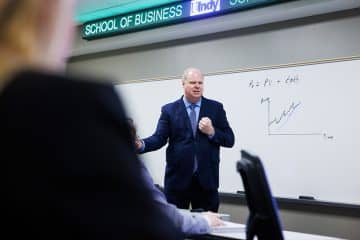The Nightmare of Fake Degrees
You’ve worked hard to get where you are, and in such a quickly moving market, you’re taking smart steps toward success by pursuing higher education. Adults like you have lots of things to consider when adding school to an already busy schedule, so it’s no wonder why millions of Americans are seeking degrees from for-profit colleges, most of which make some pretty lofty promises.
You’ve seen the ads: flashy, prestigious-sounding institutions highlight alumni success stories and boast how easy it is to earn a life-changing degree while juggling the responsibilities of a job and a family. Commercial after commercial, these schools swear to accommodate your busy schedule and promise a 90% employment rate after just a few months of study. It all sounds a little too good to be, right?
Don’t get the wrong idea—there’s a wealth of great colleges and universities that offer fantastic, flexible online courses to adult learners with the busiest of lives. But there are a few bad apples out there that are looking to trick you into paying for a degree that isn’t as great as promised. Let’s take some time to explore the world of for-profit education and the nightmare of fake degrees.
You deserve an honest education and a worthwhile degree. Keep checking in with us to see how to avoid a scam! First off, let’s learn the basics:
What is a For-Profit College?
From the 1970s to the early 2000s, the United States saw a rapid increase of for-profit institutions. Higher ed has traditionally been part of a non-profit system, but holes in the market gave profit-seeking organizations the opportunity to make a buck.
For-profit institutions are exactly what they sound like: a degree-granting school that makes a profit off its students. Oftentimes, these schools are more inclusive, offer more flexible schedules, and provide more vocational education than traditional institutions.
One of the greatest advantages of for-profit colleges is that they tend to be extraordinarily responsive to the job market and all the newest lines of work that are gaining popularity. Their goal to make a profit gives them an incentive to offer training for the new kinds of jobs that people are most attracted to.
Financial incentive can be great for these colleges to strive for cutting-edge education, but it can also pressure them into doing some pretty shady things. One way in which for-profit schools can make such new and ever-changing programs is by attaining false accreditation to make their degrees look more valuable than they really are.
Wait, What is Accreditation?
College accreditation is essentially a school’s stamp of approval. When a school or program says that it is accredited, that means that it has been recognized by a third party as legitimate and high quality. If you earn a degree from a properly accredited school, employers will be able to assume that you got a good education.
Not just any organization can accredit a school. The U.S. Department of Education and the Council for Higher Education Accreditation ultimately decide which accreditors can be trusted to evaluate the quality of schools. These organizations follow a set of standards to decide whether a school can provide legitimate training.
Unfortunately, the nation is teeming with fake accreditors that can be used to make a program seem better than it really is.
What Happens When a School’s Accreditor Is Fake?
It’s a sad truth that many (but not all!) for-profit colleges work with fake accreditors so that more students will be fooled into giving them money. Instead of making programs with students’ best interest in mind, some money-hungry companies will turn to “accreditation mills” so that they appear to be keeping up with such a fast-moving job market.
The problem with schools that are recognized by fake accreditors is that they get students to pay a bunch of money for degrees that employers can’t trust.
And no trust = no job.
The nightmare of fake degrees is a real problem in the United States, but you don’t have to be another victim. Keep your eyes peeled as you explore your options, and see that you find a school that is legitimate, worthwhile, and invested in your future.
Find a Trusted MBA Program With Abound
In order to get the most out of an MBA, you want to make sure you enroll in a program that meets your individual needs and allows you to practice your skills and connect with a network of career-boosting professionals. Our MBA database is full of accredited programs that are likely to cater to your interests—check out the schools we believe in and start your path toward an excellent Master’s Degree in Business Administration.
More Helpful Resources:
How Can I Tell if a Degree Program is Legitimate or a Scam?
3 Reasons Why Earning a Degree Will Advance Your Career and Improve Your Life





